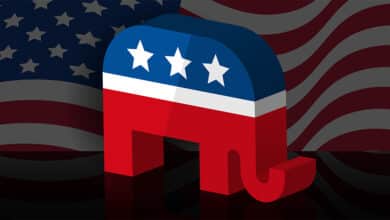After telling the Arkansas Democrat Gazette he planned to wait and run the Internet Tax 2.0 bill next week[1], Sen. Bart Hester instead ran and passed the bill (SB576) out of committee on Wednesday (March 20). The bill made significant amendments not publicly available until after the committee meeting.
The current fiscal impact is flawed in the following ways:
- Claims a $47.1 million total tax increase annually but incorporates new language to capture more potential sales. This is drastically less than estimates from last session of between $100 million to $150 million per year.
- Estimates $11.8 million tax increase annually for ALL cities and counties but in 2017 the city of Little Rock estimated they would see an increase of $10.3 million alone based on actual taxable sales numbers by the U.S. Census Bureau.
- They estimate that 80% of the impact will be from “marketplace sellers”, yet marketplace seller language was not included in previous draft legislation. However, the estimates without the marketplace sellers is now THE SAME estimate WITH marketplace sellers. Using this 80% number the true annual tax increase estimate would be closer to $235 million.
| Internet Sales Tax Estimated Annual Tax Increase | 2017 Session Estimate by Bill Sponsors | 2018 DFA Estimate WITHOUT Marketplace Facilitator Language | 2019 DFA Estimate WITH Marketplace Facilitator Language |
| State | $100 million – $150 million | $35.3 million | $35.3 million |
| Cities/Counties | Unknown
but Little Rock alone estimated $10.3 million |
$11.8 million | $11.8 million |
| Total | $100 – $150 million + cities/counties | $47.1 million | $47.1 million |
Simply put, recent estimates on SB576, and particularly SB571, appear to include budget gimmicks and tricks to prove a pre-determined outcome/estimate of revenue. Here, that outcome seems to provide the smallest possible tax increase numbers for a new internet sales tax.
The bill as amended includes a new internet sales tax that would place a point of sales tax for online purchases. This is currently not the law. Some argue the internet sales tax has been around since 1949 in Arkansas. We know there is no current internet sales tax for two reasons. One, the internet did not exist in 1949. Two, there is new legislation to change the law to implement a new internet tax. There is a use tax law on the books requiring self-reporting and payment of tax on internet purchases, but no current law exists placing a point of sale tax for internet purchases of companies without a nexus in Arkansas. Thus, the reason for this legislation.
It is important to note that this is not a tax that is paid by out of state companies. It is a tax paid by the people of Arkansas and simply collected and remitted by the companies.
The bill deviates from legislation passed and upheld by the U.S. Supreme Court from South Dakota. It is not the same as proposed through SB140 in the 2017 legislative session. This internet tax 2.0 would include third party marketplace sellers, and thus include third party purchases made on the facilitator’s websites.
Under draft legislation from the Tax Task Force last year, no language about marketplace facilitators was included. That revenue impact statement said the tax increase would be $47.1 million, with $35.3 million to the state and $11.8 million to cities and counties annually once fully implemented.
New language incorporating third party sellers should dramatically increase the revenue flowing to state, county, and city governments. HOWEVER, the new fiscal impact statement used the same numbers from the tax task force draft legislation that excluded these facilitators.
In the Senate Revenue and Taxation committee meeting this week[2], an Arkansas Department of Finance and Administration (DFA) claimed that 80% of the tax increase was from marketplace sellers, or “facilitators” as defined in the bill. These “facilitators” set up marketplaces on a website for small business third party sellers to sell their products online.
So – if the fiscal impact was a $47.2 million increase WITHOUT the marketplace facilitator language, and that is just 20% of the impact, it would stand to reason the true impact with the new marketplace facilitator language would be closer to a $235 million annual tax increase.
Further undercutting the low fiscal impact state is an estimate by the City of Little Rock that they would see increased revenue of $10.3 million if a new internet sales tax law was passed. Yet, DFA is estimating that the entire total of tax increase to all cities and counties will be just $11 million per year.
DFA refused to issue fiscal impact statements for the internet sales tax bill in the 2017 session but estimates from the bill sponsors were between $100 million and $150 million per year tax increase. New fiscal impacts filed on March 25 show that the bill would be a net tax increase in the first fiscal year.
The legislation also includes a phase in reduction of the corporate income tax top rate from 6.5% to 5.9%, extension of the net operating loss deduction from five years to ten years, and a new tax structure on car washes. The corporate tax reforms are good but undermined by the larger and longer-term impacts of extending tax and regulatory authority beyond our borders with the internet tax 2.0.
Anticipated Arguments: Some may argue that any estimates from 2017 were before Amazon started to voluntarily report, collect, and remit some taxes from Amazon purchases. However, the 2017 Little Rock estimate came after the legislation session and after Amazon started voluntarily reporting. The $100-$150 million estimates also came later in the session after Amazon started voluntarily collecting. IN ADDITION, Little Rock gave another estimate of over $10 million in 2018 based off actual sales numbers and e-commerce projects, over a year after they had been getting the voluntarily collected and remitted tax from Amazon.
[1] https://www.arkansasonline.com/news/2019/mar/18/senate-panels-poised-to-look-at-agency-/?news-politics
2017 Estimates by Sponsor on floor of AR House of Representatives, 91st General Assembly Regular Session
2018 Estimate by Arkansas Department of Finance and Administration for Draft Legislation JLL071
2019 Estimate by Arkansas Department of Finance and Administration for SB576 –
SB576 of 2019 vs. JLL071 of 2018 – New marketplace facilitator language added for SB576.
[2] http://sg001-harmony.sliq.net/00316/Harmony/en/PowerBrowser/PowerBrowserV2/20190320/-1/17064?viewMode=1#agenda_
Courtesy of Conduit For Action






